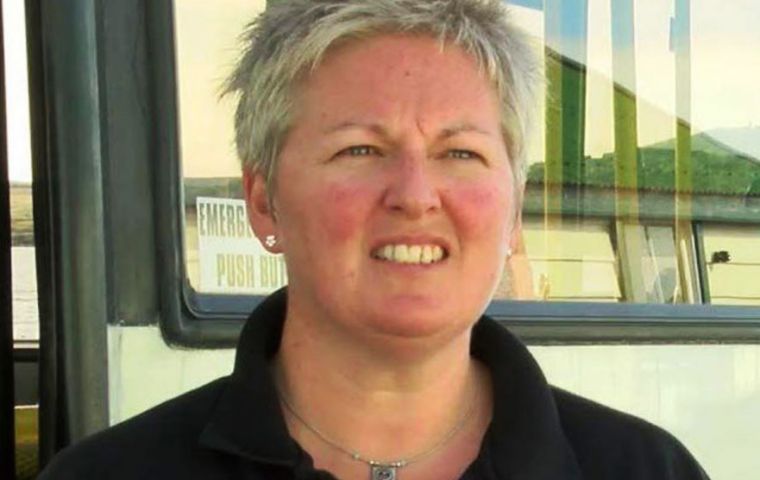MercoPress. South Atlantic News Agency
Lack of regional cooperation on fisheries could have ‘disastrous outcomes’ on Falklands finfish fishery
 Dr Andrea Clausen is the Director of the Falklands' National Resources Department. She has a PhD in Marine Biology from Bangor University
Dr Andrea Clausen is the Director of the Falklands' National Resources Department. She has a PhD in Marine Biology from Bangor University An independent study of the Falkland Islands finfish fishery has found that lack of international cooperation over fish stocks straddling international boundaries to be one of ‘the most constraining factors to sustainable ecological and economic management of the [Falklands’] finfish fishery,’ adding that ‘it is also likely to have disastrous outcomes; a prediction supported by the current status of many, although not all, of the finfish stocks.’
The conclusion was made in a report commissioned by the Falkland Islands Government, and carried out by MacAlister Elliot and Partners Limited. The review sought to ‘examine institutional and operational issues, management objectives and processes, identification of knowledge gaps, potential future science and research priorities to support the finfish fisheries, and to consider options for alternative management strategies.’ As a result of the review, the Falkland Islands Government announced on Friday a raft of changes to its fisheries management.
With regards to international cooperation, the review further recommended that the Government ‘seek the most effective strategic approach to current and longer-term situation regarding shared stocks’ and ‘establish a data-sharing programme that is robust to geopolitical changes’. The Government supported this recommendation in principle, but noted that some aspects of this recommendation ‘may be unlikely given the current geopolitical climate.’
The review also made several recommendations relating to the Falkland Islands Government’s fisheries policy and institutional capacity, and found not that no policy review has been carried out since the 2005 Fisheries Ordinance was introduced, the review found, and also noted a lack of relevant expertise in the Government’s Department of Natural Resources, particularly in the areas of: fisheries control and enforcement, strategic development, and fisheries management separate from the science/resource assessment function.
In addressing these observations, the Government said it would draft and implement a fit-for-purpose Fisheries policy, as well as update the department’s Business Plan, and it has already implemented fisheries management decision logs. In order to meet some of the capacity constraints identified by the review, the Government said it has already approved an operations manager post, and made a budget submission for a new fisheries programme director and fisheries manager to assist with the implementation of the approved changes.
The review found the department’s Scientific Programme for 2018-20 to have several issues ‘driven by limited alignment with the Government’s strategic and operational objectives, adding that there were ‘some potential inconsistencies between the evidence requirements for development of finfish stock assessments and the objectives, goals and tasks of the Scientific Programme.’
In order to address the issues identified the Government has committed to reviewing the scientific programme to reflect core responsibilities of a new, repurposed, resource assessment function. In addition, a new fisheries management function will be created within the department to allow for better separation of responsibilities between fisheries management and resource assessment.
‘A critical framework through which we can deliver a range of improvements’
Falkland Islands Government Director of Natural Resources, Andrea Clausen, said, ‘we very much welcome this independent review of our finfish fishery; it has provided a comprehensive assessment which includes acknowledgement that most of our finfish stocks straddle political boundaries which has resulted in challenges for the sustainable management, given the continued lack of international cooperation.
‘However, the solutions and actions that have been suggested, and which are within our gift even as a small island nation, will provide us with a critical framework through which we can deliver a range of improvements, such as strengthening our operational management function and governance approach, both of which will support to the sustainable ecological and economic management of this vital resource.
‘We are already very proud of what we have been able to accomplish and how our fisheries have evolved over time, however we also know that there is more that we can do and areas which should be given a higher priority, such as ensuring that the provision of future scientific and data-driven advice for resource status and sustainable catches. The recommendations which ExCo has approved will build on the brilliant work already done in this department, and will serve to further strengthen our operations over time,’ concluded Director Dr. Andrea Clausen.




Top Comments
Disclaimer & comment rulesCommenting for this story is now closed.
If you have a Facebook account, become a fan and comment on our Facebook Page!